

3.3.4 Greggs - Scone, but not forgotten! 3.3.4 Poor Porridge Promotion! 3.3.4 Impressive Numbers for the Amazon Echo - Product. 3.3.4 Dynamic Pricing for Restaurants - An Anti-Uber… 3.3.4 Train fares rise by an average of 2.3% Image copyright PA Rail passengers are facing higher fares across the UK as average price increases of 2.3% are introduced on the first weekday of the new year.
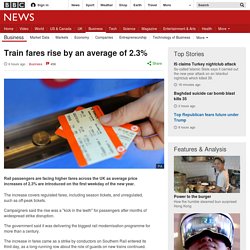
The increase covers regulated fares, including season tickets, and unregulated, such as off-peak tickets. Campaigners said the rise was a "kick in the teeth" for passengers after months of widespread strike disruption. The government said it was delivering the biggest rail modernisation programme for more than a century. The increase in fares came as a strike by conductors on Southern Rail entered its third day, as a long-running row about the role of guards on new trains continued. The RMT union began the 72-hour walkout on New Year's Eve, while another strike is set for 9 January. Why are prices rising? Image copyright Dan Kitwood By Richard Westcott, BBC transport correspondent. 3.3.4 Tesco ends gender price differences for women's. 3.3.4 How Mobile Phones have Evolved - Superb Video. 3.3.4 - Have Tablets Entered the Decline Phase of their Product Life Cycle?
Worldwide tablet shipments declined by 12.3% in the second quarter of 2016, which was the seventh consecutive quarter in which the market declined in size on a year-over-year basis.
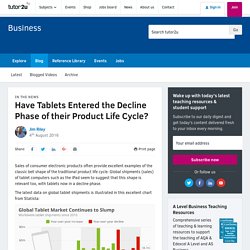
According to IDC’s preliminary estimates, a total of 38.7 million devices were shipped between April and June 2016, down from 44.1 million in 2015. Although most tablets shipped in the past quarter were Android-based, Apple continues to be the market leader with the gap between Apple and second-placed Samsung getting wider as Samsung suffered a fall in shipments by around 25%. It will be interesting to see whether Apple, Samsung and other tablet providers attempt product extension strategies in order to reverse the decline phase, or at least reduce the speed of decline.
I guess the question is, what else can you do to a tablet to encourage new customers to try one and existing customers to upgrade - other than simply upgrading the performance elements of the tablet? 3.3.4 - Should your boss be tweeting more...or not at all? Ryanair boss Michael O'Leary, perhaps misunderstanding the nature of a live Twitter Q&A, once infamously replied to a female questioner with: "Nice pic.
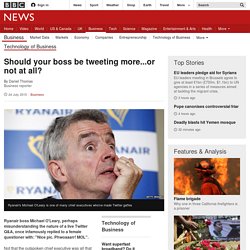
Phwoaaarr! MOL". Not that the outspoken chief executive was all that abashed by his faux pas. And two years earlier, Kenneth Cole, boss of the eponymous clothing and accessories brand, tweeted this howler during the Egyptian revolution: "Millions are in uproar in #Cairo. Rumor is they heard our new spring collection is now online... " The twitterstorm that followed forced him to make a swift apology in which he admitted that his tweet had been "insensitive" and "absolutely inappropriate".
3.3.4 Coca-Cola and the decline stage of the PLC. Publicly available information about individual brands that the Coca-Cola company sell is difficult to come by but information about the soft drink industry as a whole can be used to make some assumptions about Coca-Cola sales. 1) Falling soda sales in the USA.
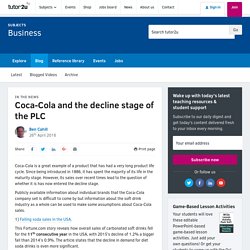
This Fortune.com story reveals how overall sales of carbonated soft drinks fell for the 11th consecutive year in the USA, with 2015’s decline of 1.2% a bigger fall than 2014’s 0.9%. The article states that the decline in demand for diet soda drinks is even more significant. Of course, just because sales are declining in one market does not mean that overall sales are falling.
3.3.4 - Starbucks drops its name and the word coffee from logo. Starbucks, the world's largest chain of coffee shops, has unveiled a new logo which it says indicates its intention to move beyond its core product.
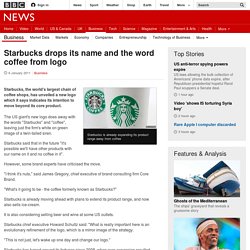
The US giant's new logo does away with the words "Starbucks" and "coffee", leaving just the firm's white on green image of a twin-tailed siren. Starbucks said that in the future "it's possible we'll have other products with our name on it and no coffee in it". However, some brand experts have criticised the move. "I think it's nuts," said James Gregory, chief executive of brand consulting firm Core Brand. "What's it going to be - the coffee formerly known as Starbucks? " Starbucks is already moving ahead with plans to extend its product range, and now also sells ice-cream. It is also considering selling beer and wine at some US outlets. Starbucks chief executive Howard Schultz said: "What is really important here is an evolutionary refinement of the logo, which is a mirror image of the strategy.
3.3.4 Prada seeks younger customers in bid for growth. Image copyright AP Italian luxury fashion group Prada has predicted a return to growth as it seeks to connect with younger customers through online sales and flexible pricing.
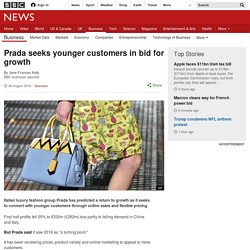
First half profits fell 25% to €330m (£282m) due partly to falling demand in China and Italy. 3.3.4 Marketing Mix: Introduction to Promotion. 3.3.4 Examining the Product Life Cycle. 3.3.3.Business Births Exceed Deaths in the UK. 3.3.3 The Segmentation, Targeting and Positioning model. Today, Segmentation, Targeting and Positioning (STP) is a familiar strategic approach in Modern Marketing.

It is one of the most commonly applied marketing models in practice. In our poll asking about the most popular marketing model it is the second most popular, only beaten by the venerable SWOT / TOWs matrix. This popularity is relatively recent since previously, marketing approaches were based more around products rather than customers. In the 1950s, for example, the main marketing strategy was 'product differentiation'. The STP model is useful when creating marketing communications plans since it helps marketers to prioritise propositions and then develop and deliver personalised and relevant messages to engage with different audiences. Audience options > Audience selection > Production positioning How to use STP? Through segmentation,you can identify niches with specific needs, mature markets to find new customers, deliver more focused and effective marketing messages. 3.3.3. Meet Britain's Leading Niche Builder! & Video. 3.3.2 Explaining Income Elasticity of Demand.
3.3.2 Coca-Cola Zero to be renamed in UK and will taste 'more like Coke' Coca-Cola is to reformulate and rename its sugar-free Coca-Cola Zero in the UK at a cost of £10m, to make it look and taste “more like Coke”.
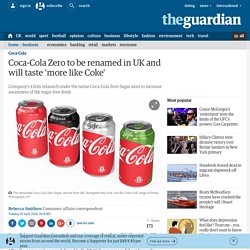
After the company’s research found half of British consumers did not know the brand contained no sugar, it will be relaunched as “Coca-Cola Zero Sugar” in June, in Coca-Cola Great Britain’s biggest product launch for a decade. Details of the revamped drink come a month after the chancellor, George Osborne, announced a surprise sugar tax on soft drinks to be introduced in 2018. The rebranding campaign will encourage consumers to try the “new and improved” drink by highlighting that it “tastes more like Coke and looks more like Coke” than the original Coke Zero.
Coke Zero, which was launched in 2006, Coke Life and Coke Diet products make up 43% of the company’s UK sales, but it said it hoped this would rise to more than 50% by 2020. 3.3.2 - Don't cook, Just Eat - Market Mapping. 3.3.2 - How teenage markets are revitalising UK towns. When Mary Portas bought a hand-made cuddly toy from her stand, 18-year-old Christine McDonald knew that forfeiting a Saturday morning lie-in to set up her market stall had been worth it.
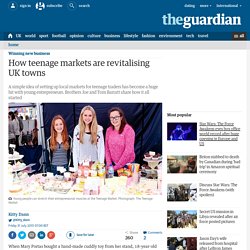
Browsing her stall, Portas told McDonald to hike her prices up, advice that the young trader has taken on board. Now 22, McDonald is preparing to start selling her products from a shop in Stockport town centre – but she wouldn’t be where she is today without her debut at the Teenage Market, an event set up by brothers Joe and Tom Barratt to breathe new life into flagging UK markets.
The business partners, now 22 and 21, were in their teens when they set up the Teenage Market – which gives young people a free platform to trade at specially organised events – three years ago. Inspired by fair the Vintage Village, the Stockport-based brothers decided to organise a pop-up style market trading event for young people in their home town.
3.3.2 - Just Eat: The £5.5bn firm fuelled by our takeaway obsession. Image copyright Getty Images If you're going to pick up a takeaway on your way home tonight instead of cooking then you're not alone.
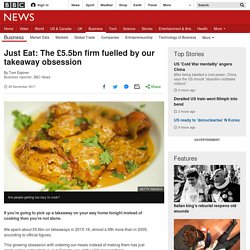
We spent about £6.6bn on takeaways in 2015-16, almost a fifth more than in 2009, according to official figures. This growing obsession with ordering our meals instead of making them has just made online order start-up Just Eat into one of the UK's biggest firms. The firm - which only listed on the London Stock Exchange in 2014 - has now been catapulted into the FTSE 100. The firm takes online orders on behalf of restaurants and then delivers them, charging between 13% and 14% commission on each UK order. The popularity of its services has seen the firm grow from its humble beginnings in a Danish basement in 2001 into a firm valued at a whopping £5.5bn.
The means it's worth more than one of the UK's most popular supermarkets Sainsbury's. Image copyright PA But is its rise because people are just getting too lazy to cook? Image copyright Ceri Oakes. Asda to change price promotions after CMA investigation. Image copyright PA Asda is to change its price promotions after being singled out by the competition regulator in a probe into supermarket pricing practices.
Asda has given a commitment to the Competition and Markets Authority (CMA) that it will alter the way it presents promotional deals. However, the supermarket said there were no specific findings against it. The regulator was investigating whether supermarkets were misleading customers with confusing price promotions. 3.3.1 The Body Shop: What went wrong? "A confused shop with a mish-mash of products with no emphasis on the fact that this is supposed to be a shop specialising in cruelty-free, fair trade toiletries and make-up," is Suzy Bourke's damning verdict on The Body Shop. The 42-year-old stage manager used to be a regular shopper at the High Street chain, but now she tends to go to Boots instead.
And she's not alone. Its owner, cosmetics giant L'Oreal, wants to offload the High Street chain, which has been suffering slowing sales. The Body Shop, founded by Dame Anita Roddick in 1976, was a pioneer using natural ingredients for its beauty products when it started out. It initially thrived, expanding rapidly, and by the 1980s was one of the most well-known brands on the High Street. I remember the chain fondly from my youth, when it seemed to be an exciting shop full of affordable, fun and exciting products. But by the early 2000s, rivals had caught up, with firms such as Boots, for example, developing similar natural beauty ranges. 3.3.1 - Market in Focus - UK Bicycle Market. 3.3 LEGO Surprisingly Wants You to Stop Buying Its Toys. Here's Why. In 2003, LEGO nearly went bankrupt. But a decade later, business is going almost too well, forcing the company to do something rather unusual: discourage customers from buying its products.
That’s right — the 67-year-old Danish toymaker (which has seen revenue increase by an average of 15% a year for the past 12 years) aggressively scaled back its advertising efforts last year because demand was simply too high. Time to prep for the future and catch a much-needed breather Or as CFO John Goodwin puts it, “We are of course excited about [LEGO’s success], but the high demand also puts a strain on our factories… We feel we need to invest, to build some breathing space.”